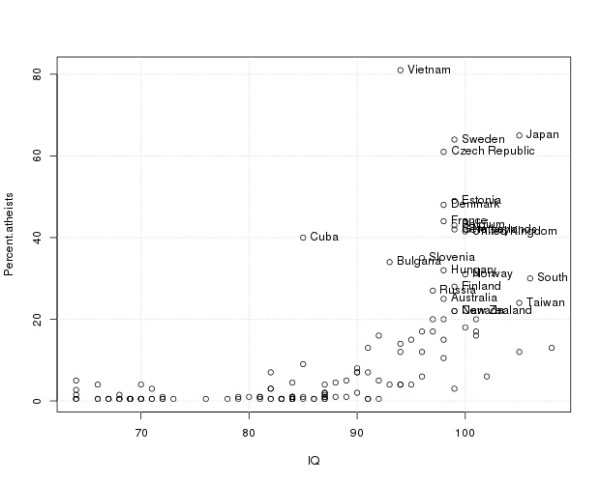Do Atheists Really Have Higher IQs than Believers?
by Dr. William M. Briggs
Filed under Atheism
Some atheists maintain their non-belief comes through superior intelligence. In particular, many online atheists like to quote, “A fool says in his heart there is a God.” He reads only those sources which confirm and conform to his view and eschews those which do not. And he isn’t shy about telling you how dumb it is not to believe as he does.
But consider: nearly all the greatest, best, highest, most beautiful minds that ever existed were theists. Aristotle? Augustine? Confucius? Aquinas? Bonaventure? Copernicus? Bruno? Kepler? Galileo? Pascal? Descartes? Newton? Bach? Mendel? The list is endless. Most people were and still are theists of one sort or another. It is only in the twentieth and twenty-first centuries where atheism picked up steam.
If one is to study the association between intelligence and religious belief it is clear that one must account for history. The year 1928 is not the same as 1978 particularly in countries like Vietnam, where in 1928 many theists lived, but where in 1978 they have mostly disappeared. The date is especially important if we define theist as one who publicly checks “Believer” on a survey, a survey the government may soon learn about. (For 1978 Vietnam did not take kindly to discover believers in its midst.)
In the above example, I did not choose the year 1928 arbitrarily. It was the time of the first study in the dataset reanalyzed (for the umpteenth time) by Miron Zuckerman, Jordan Silberman, and Judith Hall in their paper “The Relation Between Intelligence and Religiosity: A Meta-Analysis and Some Proposed Explanations” in Personality and Social Psychology Review. The conclusions in this paper have recently gone viral around the Internet.
One problem, however, is that in their study, Zuckerman et alia don’t recognize history as much as do Richard Lynn, John Harvey, and Helmuth Nyborg in their original analysis (data here). In their “Average intelligence predicts atheism rates across 137 nations” in Intelligence, they say:
"Two of the most anomalous are Cuba and Vietnam, which have higher percentages disbelieving in God (40% and 81%, respectively) than would be expected from their IQs of 85 and 94 (respectively). This is likely attributable to these being former or current communist countries in which there has been strong atheistic propaganda against religious belief. In addition, it has sometimes been suggested that communism is itself a form of religion in which Das Capital is the sacred text, Lenin was the Messiah who came to bring heaven on earth, while Stalin, Mao, Castro and others have been his disciples who have came to spread the message in various countries."
Too bad they still used the data in their analysis. But then so did Zuckerman.
Here’s the picture of the data (the news media and Wikipedia have this backwards; the authors call atheism “non-religiosity”, a category which is fuzzy and which probably includes some theists, of a sort):

If we accept the data as is we learn that for IQs around 100, percent atheism runs from near 0% to over 80%. This means, of course, that IQ has little to say about percent atheism when IQs are around 100, which is defined as the mean. The USA, incidentally, has IQ 98.5 and percent atheism 10.5%.
The bottom IQs, and also lowest percent atheists, belong to Cameroon, Central African Rep, Congo, Ethiopia, Mozambique, Sierra Leone, Gambia, Senegal, Zimbabwe, Guinea, Haiti, Liberia. You get the idea; many from the 1960s and 1970s, some earlier. But is it fair to compare Africa to modern Europe?
Another serious problem is that Zuckerman and friends cobbled together over sixty studies. Their Table 1 shows that the mechanism to measure IQ was different in different locations. The proportion of males varied from unknown, to low, to 100%. The measures of religiosity differed at different locations. Religions were also hugely different (is it the same to believe in animism as Protestant Christianity?). The samples, particularly in developed countries, were college kids, but elsewhere more non-college and precollege people were used. The lowest sample size was 22, but most were a hundred or so, with one topping out at over 14 thousand. And we already mentioned the widely disparate years the samples were taken.
Data of every flavor was observed, data that should not be mixed without an idea of how to combine the uncertainty inherent in each study and in how, say, kinds of IQ measurements map to other kinds of IQ measurements. In other words, they mixed data which should not be mixed, because nobody has any idea how to make these corrections.
But suppose somebody did know how. Then what? What could we possibly learn? Nothing. Or nothing of any use, except perhaps the extent which enculturation works (to convert people to atheism and theism). Look: we have already agreed that many people much smarter than us have been theists, but we also know that some clever folks have been non-theists. If we’re after raw body counts, the theists win handily.
Just because a person is or isn’t intelligent contributes nothing, not a thing, to the truth or falsity of any proposition (not related to the individual). Does God exist because Aristotle, perhaps the greatest intelligence of all, said so? Of course not. Is relativity true because Einstein, no small brain, thought it up? Again no. If it were true that merely being intelligent conferred truth then we would never have political disagreements, because all we’d have to do is give everybody an IQ test and put whoever scored highest in charge.
Except that highly intelligent people believe stupid and false things. And at a rate too depressing to contemplate.
Related Posts
Note: Our goal is to cultivate serious and respectful dialogue. While it's OK to disagree—even encouraged!—any snarky, offensive, or off-topic comments will be deleted. Before commenting please read the Commenting Rules and Tips. If you're having trouble commenting, read the Commenting Instructions.













